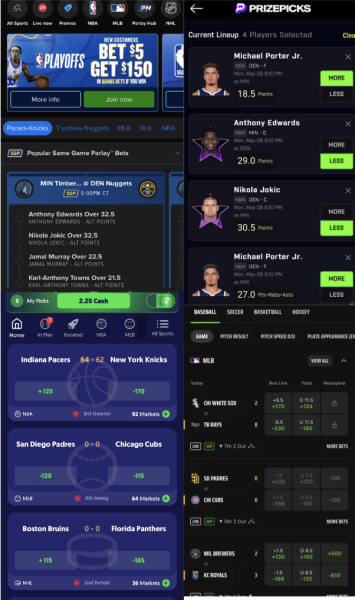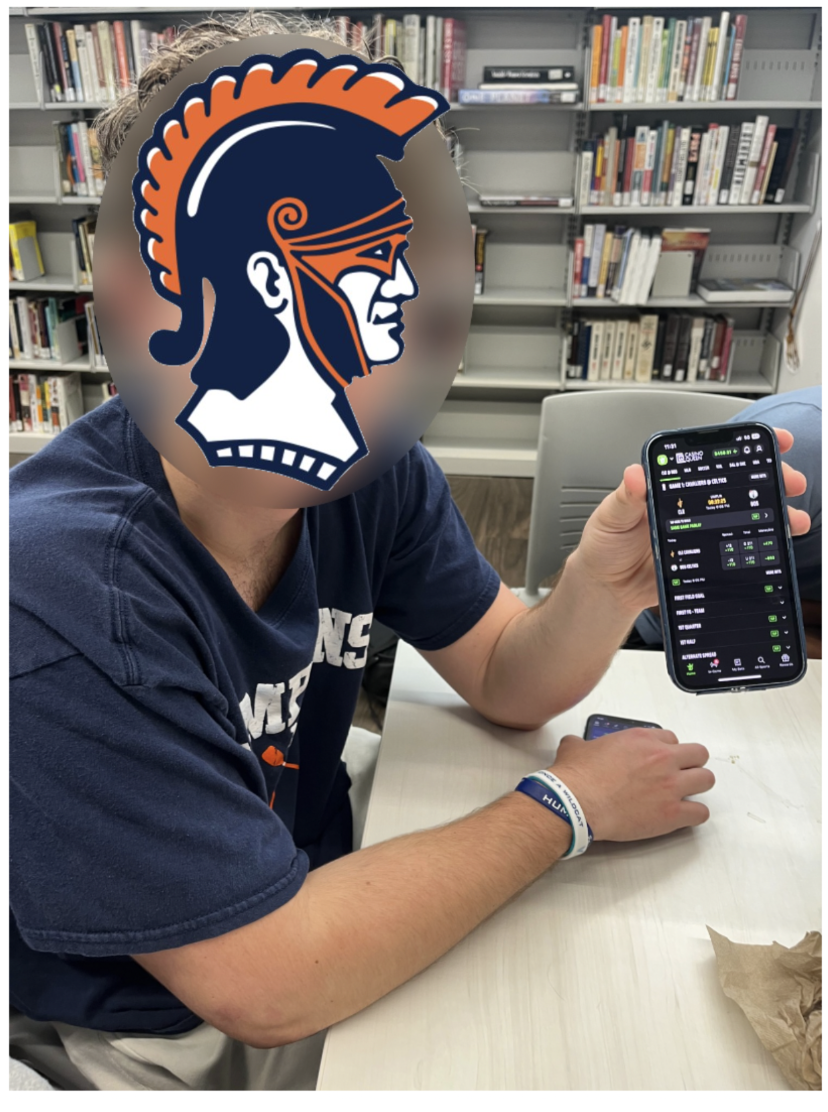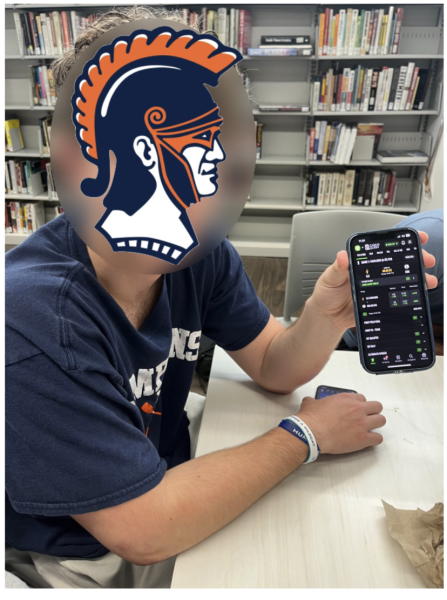Note: Student names in this article have been omitted to protect anonymity.
Casting furtive looks around the Learning Commons, numerous Latin upperclassmen, in interviews with The Forum, discussed the allure of underage sports betting and revealed the extent to which the illegal enticement occurs at Latin.
“There’s just a little tingle all throughout my body, especially in my fingers,” noted Student #1, a senior male. “It just gets me going—the tingle is like a magnet, attracted to my sports betting app.”
In 2018, the Supreme Court officially struck down the federal law prohibiting sports betting, opening the door to an explosion of participation in the previously illegal form of entertainment. Throughout 2023, the sports betting industry generated nearly $11 billion of revenue, marking a historical 44% year-over-year increase from 2022.
While sports betting is no longer federally prohibited, individual states can still make their own decisions on its legality. As of April 2024, 38 states and the District of Columbia permit sports betting, with one notable limitation: In most jurisdictions where sports betting is legal, you have to be at least 21 years old to participate.
In Illinois, wagering money on sports games was officially legalized in August 2021. The Illinois General Assembly’s Sports Wagering Act states that any person placing a wager on a sports game must be at least 21 years old, and any winnings earned by a person under this age are to be forfeited to the state.
“I think it probably should be limited to adults who can make better decisions, or at least have the capabilities to make better decisions,” Upper School math teacher and avid sports fan Zach McArthur said.
The Latin Student Handbook strictly prohibits any student from gambling, in any form.
“Because it’s illegal, and because it’s in our handbook, [sports betting] is breaking a pretty major school rule,” Upper School Director Nick Baer said. “A student [caught sports betting] would have to go through the disciplinary process.”
However, Mr. Baer’s concerns about sports betting extend past the disciplinary consequences. “I’m sure the majority of it is just for fun, but I think the difference is what starts off as what is fun can get pretty serious, pretty quickly,” he said.
Given that underage sports betting is such a widespread activity, state governments have challenges enforcing this legislation. Student #2, a senior male, shared that they “do not care one bit” about breaking the law, and Student #3, a senior male, stated that “[gambling is] a victimless crime.”
“High school students are generally of an age where the part of the brain that is really good at weighing risk versus reward is not really developed,” Upper School math teacher and former World Series of Poker participant Chris van Benthuysen said. “That’s why we impose rules around certain things.”
To evade state-imposed age restrictions on sports betting, many students employ alternate measures to access the necessary apps and websites to wager money.
“Like a lot of things that teenagers do, [sports betting] is easy to do without someone ‘catching you,’” Mr. Baer said.

Popular sports betting apps such as DraftKings and FanDuel require a Social Security number, a valid address, and a legal first and last name. To get around this security feature, minors will use the personal information of their parents and relatives, often without their knowledge.
“My friend had an account,” Student #4, a senior male, said. “So I just said, you know what, my dad needs one now, too.”
Additionally, many students have begun using the platform Fliff, a social sportsbook app that requires users only to be at least 18 years old. Alongside a typical monetary betting system that grants users one dollar a day, Fliff offers a risk-free option for sports betting—users can bet Fliff coins, a virtual currency provided every two hours.
While real-world earnings cannot be withdrawn without legal government ID, students still perceive their winnings as profit. Student #2 said, “I use Fliff because I get my free dollar a day. I don’t put money in, and I get free money.”
“Honestly, I call myself a hustler—I love to make money,” Student #4 said. “[Sports betting] is a great way to make money, especially if you’re knowledgeable about the sporting world like me. I basically know what’s going to happen before it happens.”
However, many students don’t engage in sports betting for the monetary returns.
“I want the rush that comes with it,” Student #5, a junior male, said. “There’s a sort of adrenaline rush that comes with sports betting. I want to be a part of the sports game and entertain myself.”
While sports betting also has the potential to form and strengthen friendships, it can lead to poor emotional decisions, particularly for underage participants.
“For a young person, it can be difficult to see the big picture, get wrapped up in what’s happening in the moment, and get caught in, ‘Well, I need to win that money back,’” Mr. van Benthuysen said. “Then [you] let emotions cloud decisions, start making bad decisions, and you are more likely to be losing than winning.”
Psychologically, the parts of the brain that process emotion develop before the part of the brain that processes complex information, known as the prefrontal cortex. This development causes younger people to be more susceptible to making poor decisions provoked by highly emotional situations, as well as being more susceptible to gambling addictions.
While sports betting, the brain secretes more dopamine than partaking in smoking, drugs, or alcohol—as Student #3 described, sports betting is “pure dopamine.”
Sports betting sites and apps use these emotional triggers to increase their profits.
“There’s a rush when you win a bet, and these betting sites and casinos know exactly to give you that rush, and also that you lose in the long run,” Mr. McArthur said.
This exact process circulates in students’ brains as they wager their money.
“If you’re down in money, you can’t stop betting, and if you are up in money, you might as well ride the wave,” Student #6, a senior male, said.
Despite the potential legal and psychological consequences, the Latin community often ignores the illegality of sports betting.
“I think that anything illegal isn’t talked about too much.” Mr. McArthur said. “From my perspective, [sports betting] is not as big of a problem as drugs and alcohol, because that can directly affect your well-being, whereas this is more of a crushing financial problem.”
Mr. Baer said, “It’s always hard to tell when people are talking seriously about betting money, or just the lines, so it’s hard to parse whether students are betting or not.”
The dismissal of sports betting and its consequences may vary from school to school. “At Latin, we can tend to have too gray and blurred lines about things like [sports betting],” Mr. van Benthuysen said. “The blurriness and grayness of that line where it feels safe to talk about it in the open has little to do with the topic of sports betting and more the culture of this school.”
While students perceive their sports betting as inconsequential fun, addiction can occur at any level.
“I would be pretty cautious around betting,” Mr. McArthur said. “It can get addicting, even at small levels, and spiral into something that really affects your entire life.”
Mr. McArthur’s cautionary words emphasize the need for responsible betting education. In 2023, Virginia passed a law that requires high schools to have classes on gambling and its addictive potential, possibly encouraging other states to follow suit.
In fact, education on responsible sports betting in young people can help avoid addiction. “It’s important for us to educate students on the dangers of gambling and sports betting,” Mr. Baer said. “It’s easy to get caught in pretty deep—[sports betting has] changed in a way that, to me, as an educator, is much more concerning.”
While not every student will choose to sports bet responsibly, consulting a trusted adult may help mitigate the consequences.
“I hope that if [sports betting] is taking place, students have had conversations with their parents, and their parents have decided that this is something that [they’re] okay with,” Mr. van Benthuysen said.
Or, as Student #7, a senior male, recommended, “You have to look at sports betting as entertainment, you can’t look at it as a fix. It’s no different than going to a movie, or seeing a play.”
This story was originally published on The Forum on May 8, 2024.





































